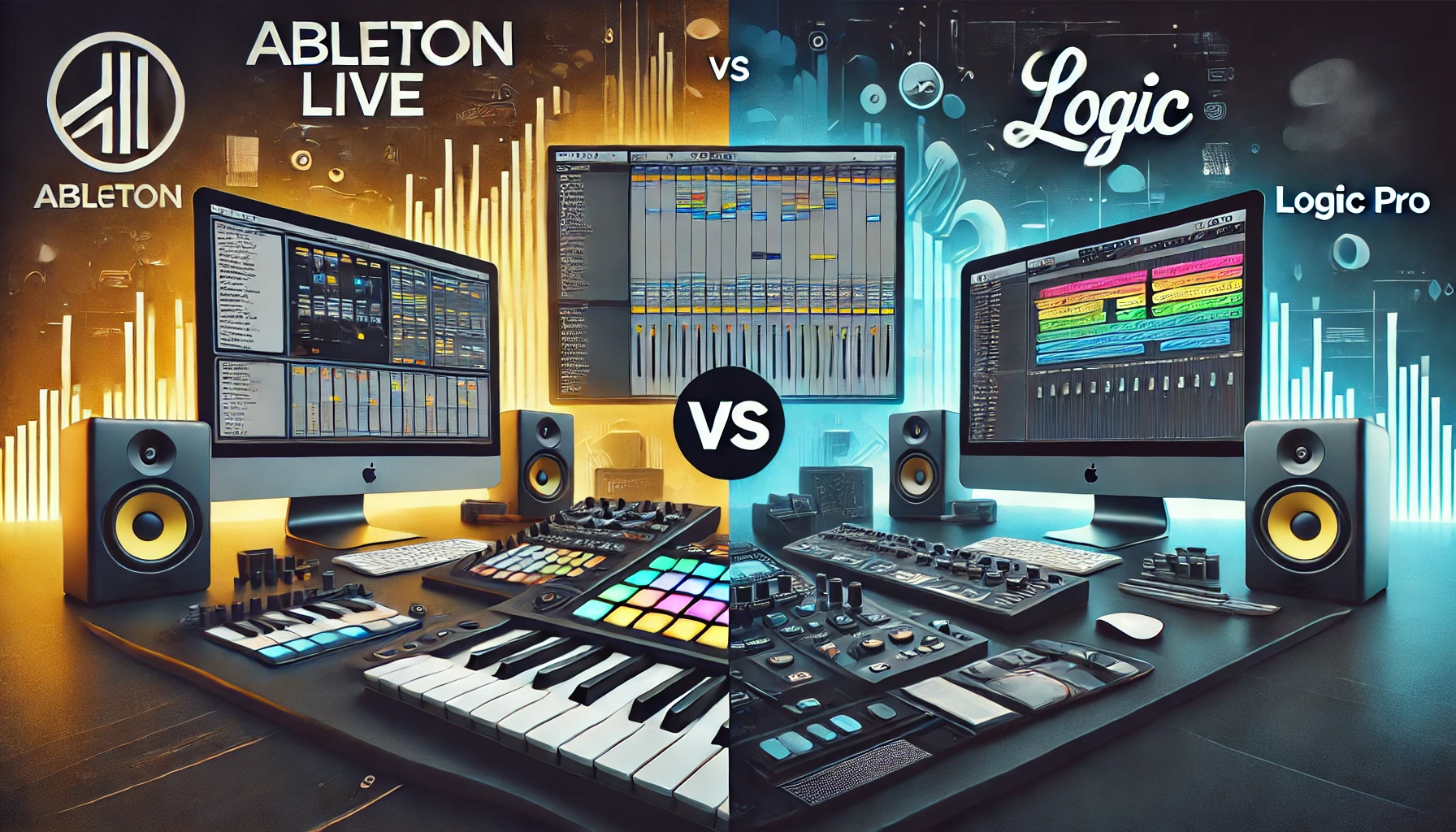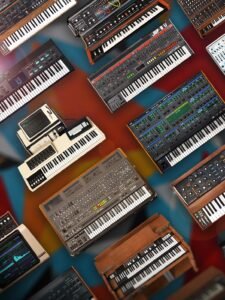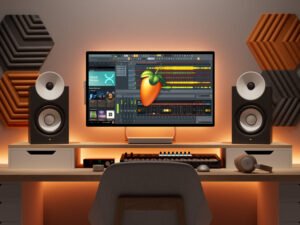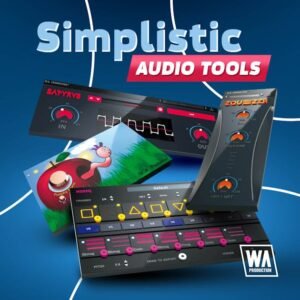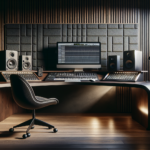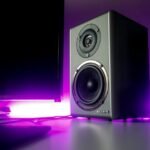When it comes to music production, the choice of the Digital Audio Workstation (DAW) can greatly influence your creative process. Two of the most popular DAWs in the industry are Ableton Live and Logic Pro. Both offer a plethora of features and have established themselves as industry leaders. However, when pitting Ableton vs Logic, which one emerges victorious? This article delves into an in-depth comparison of these two DAW giants to help you make an informed choice.
Introduction to Ableton and Logic
Ableton Live, simply referred to as Ableton, and Logic Pro, commonly known as Logic, are two software applications that have revolutionized the landscape of digital music production. Both are loaded with powerful features that cater to the needs of both beginners and seasoned music producers. Ableton vs Logic is a main event showdown!
Ableton Live
Ableton Live, developed by Berlin-based Ableton, is renowned for its non-linear, flexible approach to music creation. It’s a favorite among electronic music producers and live performers due to its unique Session View, which allows users to improvise and experiment in a non-linear fashion.
Logic Pro
Logic Pro, on the other hand, is a product of tech giant Apple. It offers a comprehensive suite of tools for music production, including recording, editing, and mixing. With a traditional, linear workflow, Logic Pro is especially favored by songwriters and film composers.
Workspace Comparison
The workspace is the user interface where you interact with the DAW. It’s crucial to have a comfortable and intuitive workspace that fosters creativity.
Ableton’s Workspace
Ableton’s workspace is unique and innovative. Its Session View offers a grid-like space where you can load, record, and play with loops and samples freely. This provides a creative and experimental playground for music producers. In contrast, the Arrangement View presents a more traditional, linear workspace.
Logic’s Workspace
Logic Pro offers a more conventional, linear workspace. It has a clear and well-organized interface that makes it easy to record, edit, and mix tracks. Logic also includes a dedicated mixer window, similar to what you’d find on a physical soundboard. This can be particularly helpful when dealing with complex projects with multiple tracks.
Functionality
Functionality is all about the ability of the DAW to meet your specific needs. Both Ableton and Logic shine in their own ways when it comes to functionality.
Ableton’s Functionality
Ableton stands out with its clip-based sequencing environment known as Session View. This is a unique feature that allows you to create and arrange music in a non-linear way. It’s particularly useful for live performances and experimental music production. Ableton also excels in MIDI mapping, making it easy to control various parameters with external hardware.
Logic’s Functionality
Logic Pro, on the other hand, is hailed for its comprehensive MIDI editing capabilities. It offers a sophisticated piano roll editor and a powerful notation editor, making it a great choice if you want to work with traditional scored music. Logic also supports the AU (Audio Units) plugin format, which provides a wide variety of third-party instruments and effects.
Built-in Tools
Both Ableton and Logic come packed with a variety of built-in tools, including virtual instruments and audio effects.
Ableton’s Tools
Ableton comes with a good number of high-quality built-in tools. Its flagship synthesizer, Wavetable, is a versatile instrument perfect for crafting unique sounds. Ableton’s Drum Rack and Sampler are also powerful tools for beat-making and sound design.
Logic’s Tools
Logic Pro, on the other hand, boasts a more extensive selection of built-in tools. Its flagship synth, Alchemy, is a multi-engine synthesizer that can handle additive, spectral, granular, and virtual analog synthesis. Logic also includes a suite of high-quality effects and a range of virtual instruments modeled after classic hardware.
Audio Recording and Editing
Both Ableton and Logic provide robust features for audio recording and editing.
Ableton’s Audio Capabilities
Ableton excels in loop-based audio recording and editing, thanks to its Session View. It also offers powerful audio warping capabilities, allowing you to manipulate the timing and pitch of audio with ease.
Logic’s Audio Capabilities
Logic Pro shines in traditional audio recording and editing. It offers comprehensive audio manipulation features, including Flex Time and Flex Pitch for detailed time and pitch editing. Logic’s Take Folders and Quick Swipe Comping are also handy for compiling the perfect performance from multiple takes.
MIDI Composition
When it comes to MIDI composition, both Ableton and Logic have their strengths.
Ableton’s MIDI Capabilities
Ableton offers a straightforward and efficient workflow for arranging MIDI clips, especially in its Session View. It also provides unique features like automatic clip looping and the ability to set up MIDI notes to repeat like a loop pedal, making it a powerful tool for live performances and songwriting.
Logic’s MIDI Capabilities
Logic Pro offers more comprehensive MIDI editing features. It has a robust piano roll editor, a variety of MIDI transform options for humanizing, randomizing, and more. In addition, it includes a notation editor for those who prefer to work with traditional scored music.
Plugin Support
Plugins are additional software that can be used within a DAW to extend its functionality, offering new instruments and effects.
Ableton’s Plugin Support
Ableton supports both VST2 and VST3 formats, along with its own Max for Live devices. This means you can use a wide variety of third-party plugins with Ableton, extending its capabilities even further.
Logic’s Plugin Support
Logic Pro only supports the AU (Audio Units) plugin format. While this might limit the choice of plugins slightly, there is still a vast selection of high-quality AU plugins available. Plus, Logic’s extensive selection of built-in tools often reduces the need for additional plugins.
Pricing
When it comes to price, there is a significant difference between Ableton vs Logic.
Ableton’s Pricing
Ableton Live comes in three versions: Intro, Standard, and Suite. The price increases with each version, with the Suite version being the most expensive. However, the Suite version also offers the most features and included tools.
Logic’s Pricing
Logic Pro, on the other hand, is available as a one-time purchase. It only comes in one version, which includes all features and tools. This makes Logic Pro a more affordable option, especially considering the extensive range of features it offers.
System Requirements
Your choice between Ableton vs Logic might also depend on the computer system you are using.
Ableton’s System Requirements
Ableton is compatible with both Windows and macOS, making it a versatile choice regardless of your computer system.
Logic’s System Requirements
Logic Pro, on the other hand, is only available for macOS. This means if you are a Windows user, Logic Pro will not be an option for you.
Community and Learning Resources
Both Ableton and Logic have large, active user communities and offer extensive learning resources, making it easier for beginners to get started and for experienced users to continue learning.
Ableton’s Community and Learning Resources
Ableton offers a wealth of online tutorials, forums, and user groups. It also hosts regular events and workshops around the world, providing opportunities for users to learn, share, and connect with others.
Logic’s Community and Learning Resources
Logic Pro also has a large user community and offers extensive online resources, including tutorials, forums, and user groups. In addition, as an Apple product, Logic Pro users can access support and training from Apple Stores worldwide.
The Verdict
In the showdown of Ableton vs Logic, the choice ultimately depends on your specific needs and preferences.
If you’re into live performance, sound design, or electronic music production, Ableton Live’s unique Session View, powerful audio warping capabilities, and extensive MIDI mapping features might be the best fit for you.
On the other hand, if you’re focusing on songwriting, traditional recording, or film scoring, Logic Pro’s comprehensive MIDI and audio editing features, along with its impressive suite of built-in tools, might be more appealing.
Remember, the best DAW is the one that fits your workflow and inspires you to create. So, take advantage of the free trials offered by both Ableton and Logic to see which one feels right for you.
Final Thoughts
The Ableton vs Logic battle boils down to personal preference, workflow, and the type of music production you engage in. Both DAWs are powerhouses in their own right, offering a plethora of tools and features that can cater to a wide range of music production needs.
Whether you lean towards the non-linear, performance-oriented workflow of Ableton or the traditional, linear approach of Logic, both DAWs are capable of producing professional-quality music. Experiment with both, and choose the one that best aligns with your creative process. Remember, the best DAW is the one that inspires you to make music.
FAQs
Q: Can I use Ableton Live on both Windows and Mac? A: Yes, Ableton Live is compatible with both Windows and macOS, offering flexibility for users of different operating systems.
Q: Is Logic Pro available for Windows? A: No, Logic Pro is exclusively available for macOS users. Apple does not offer a Windows version of Logic Pro.
Q: Which DAW is better for beginners? A: Both DAWs have features that are friendly to beginners. Ableton Live is often praised for its intuitive workflow and creative performance capabilities, while Logic Pro is valued for its comprehensive suite of tools and linear approach. The choice depends on your personal learning curve and the style of music you wish to create.
Q: Are there any free versions of Ableton or Logic available? A: Ableton offers a free trial that allows users to explore its features for 90 days. Logic Pro does not have a free version, but it does offer a 90-day free trial as well.
Q: Which DAW is better for live performances? A: Ableton Live is specifically designed with live performances in mind, thanks to its Session View and extensive MIDI mapping capabilities. It’s the preferred choice for musicians and DJs performing live.
Q: Can I produce professional-quality music with either DAW? A: Absolutely. Both Ableton Live and Logic Pro are powerful, professional-grade DAWs used by producers worldwide to create commercial and critically acclaimed music across all genres.
Q: Do Ableton and Logic Pro offer educational discounts? A: Yes, both Ableton Live and Logic Pro offer educational discounts for students and teachers. Check their official websites for eligibility criteria and discount rates.
Q: Which DAW offers better virtual instruments and effects? A: Logic Pro is known for its vast library of high-quality virtual instruments and effects. However, Ableton Live also offers a solid range of built-in devices and excels in electronic music production. The choice depends on your specific needs and the genre of music you’re producing.
Q: How does the plugin support compare between Ableton and Logic? A: Ableton supports VST2, VST3, and AU plugin formats, along with its own Max for Live devices, providing a wide range of third-party plugins. Logic Pro supports only AU (Audio Units) plugins but offers a vast selection of high-quality built-in tools that often reduces the need for additional plugins.
Q: Which DAW is more cost-effective in the long run? A: While Logic Pro offers a one-time purchase, Ableton Live has different versions and pricing tiers, including free lifetime updates. The long-term cost-effectiveness depends on your needs and whether you’ll benefit from Ableton’s free updates or prefer Logic’s comprehensive out-of-the-box toolkit.
This post may contain affiliate links. If you make a purchase through these links, we may earn a small commission at no additional cost to you.

